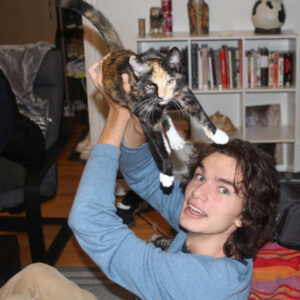The first thing you notice about Joseph Edward-Smith, recipient of the Dr. Carrie Best Scholarship, is that he’s good at conversation. He speaks heartfully about his journey to King’s which, in earthly miles, likely has most other students beat. Born in Brisbane, Australia, he’s lived his life, with many back and forths, between Melbourne, where his mother lives, and Prince Edward Island, home to his grandparents. Then there’s his deeper, personal journey that’s equally intriguing. Joseph Edward-Smith has covered ground. We spoke to him recently about his new life at King’s.
What put King’s and the Foundation Year Program [FYP] on your radar?
I knew about King’s. It was almost a mythological entity to me. Both my parents did FYP. It’s where they met and they both loved it here. So for me, there was this kind of awe and grandeur to it. But I never considered myself to be an arts student. For a long time, I was going to go into medicine. Until my Grade 11 teacher in Melbourne, Miss Carrol, this terrifying Irish woman, put a book of Seamus Heaney’s poetry on my desk and said, ‘This will change your life.’ And it did. I realized that literature and the world of books…I felt like this is the only world I wanted to be a part of.
And how are you finding FYP so far…the program and the culture?
The beautiful thing about FYP is that everyone who is doing FYP wants to do FYP. No one is using it as a means to an end and so there’s this kind of universal internal motivation for doing it. It’s been the greatest thing I’ve ever done and the worst thing. The first thing you learn is that you don’t know very much. Being in a room of 200 people who are all brilliant and hard-working…it’s really intimidating. Most of the students in the program are used to being high achievers. And you come in and you realize that you’re just part of the pack now. And there’s something that is both absolutely liberating about that and totally terrifying. I think FYP sets a lot of people free in a way that they didn’t expect.

What do you love specifically about FYP?
Honestly, I love it all. I love the way FYP is presented almost like a novel. It’s like all the thinkers are characters in it. You go in every morning, and you hear these brilliant people speak in the most articulate way and you read these excellent books and you have to write constantly about them. It’s all so beautifully unified into one experience.
And life at King’s?
It’s the best. It is just the best. And everybody knows it and that’s part of what makes it the best. Everyone knows and understands the gravitas of their situation and they’re all making the most of it. King’s has this very self-containing environment which I personally love.
Congratulations on the Dr. Carrie Best Scholarship which, as you well know, honours high achieving Indigenous or Black Canadian students. To what extent is your Indigenous heritage a part of how you see yourself in the world right now?
It’s a great question and one I ask myself a lot. It’s not always been a part of my life that I’ve focused on. My grandfather and our family totally assimilated. We were immersed in English culture and we thrived in it; my grandfather was a high school teacher in PEI, my mother is a midwife in Melbourne, Australia. There is a kind of glory in that but there is also a deep and profound alienation in the awareness that to be the person that I am, that has meant sacrificing, though unwillingly, because this is something that happened before my birth. But it has meant sacrificing a part of my identity. That said, I’m an Indigenous man. My mom’s family comes from the Six Nations Reserve in Ontario. My mom is a Mohawk woman.
How does that play out for you? How do you carry that awareness?
When you’re Indigenous, the government designates your home. If you’re an Indigenous person and your home is being institutionally designated, you have to choose between poverty, really, because most of the reserves are impoverished, or sacrificing your identity. And that is the choice that you’re posed with. And that is what assimilation is. And you’re in this sort of heartbreaking place where you could never have gone to the school that allows you to be the Dr. Carrie Best scholar if you weren’t Indigenous, but when you get it, you feel the weight of not being able to fully participate in what it means.
You’re half-way through your Foundation Year. What are you planning for next year?
I’m going to move into Contemporary Studies. For one thing, I want to stay here. The thought of leaving King’s campus is too heartbreaking for me. And then, I think, teacher’s college. The thing that brought me into this world was a life changing English teacher and if I could be that for someone else this story would feel complete. I have a lot to give to teenagers, younger people who sort of feel lost because I felt that way for a long time. And I’d love to stay in Halifax. I love it here.
Worth up to $20,000 over four years, the Dr. Carrie Best Scholarship is open to Black and Indigenous students in Canada who demonstrate academic excellence. Learn how to apply for this and other major scholarships before the March 1, 2024, deadline.

